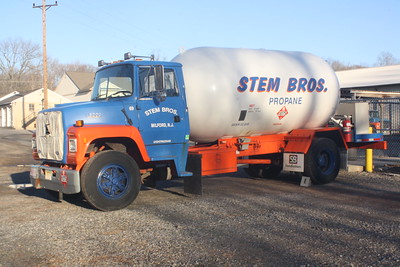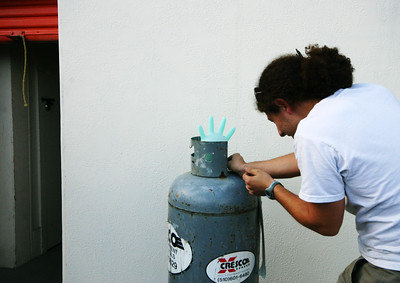
Yes, you can use LPG (Liquefied Petroleum Gas) in place of propane since propane is actually a component of LPG. LPG is typically a mix of propane and butane. But before you make the switch, there are a few things you should consider:
First, check if your equipment is calibrated for pure propane or if it’s compatible with LPG. The performance of your equipment might change based on the ratio of propane to butane in the LPG, especially in colder climates where butane may not be as effective.
Safety should always be your top priority; make sure that your fittings and regulators are appropriate for the gas you’re using. Lastly, remember that the composition of LPG can vary depending on where you are. In some places, it might lean heavily towards propane, while in others, butane might be more dominant.
So, while you can use LPG as a substitute for propane, it’s essential to be informed and take precautions to ensure safety and effectiveness.
Similarities Between LPG and Propane
LPG and propane are often mentioned together in various contexts, which sometimes leads to them being confused as the same substance. While they are different, they do share some significant similarities.
1. Composition of LPG: The most fundamental similarity is that propane is a component of LPG. LPG, or Liquefied Petroleum Gas, is not a singular gas but a mixture. Its primary components are propane (C3H8) and butane (C4H10), with the proportion of each varying depending on the source and the intended use. Therefore, when you’re using LPG, you’re also utilizing propane.
2. Common Uses and Applications:
- Heating: Both LPG and propane are extensively used as fuel for heating in homes, especially in areas without access to natural gas lines.
- Cooking: Many stoves and barbecue grills use either LPG or propane as a fuel source. In camping scenarios, small portable stoves often run on canisters containing these gases.
- Vehicle Fuel: In various parts of the world, vehicles, especially taxis and buses, run on LPG or propane as an alternative to gasoline or diesel. They are considered more environmentally friendly compared to traditional fuels.
- Refrigeration: Some older refrigeration systems, especially those used in RVs and campers, operate on propane or LPG.
- Industrial Uses: Both gases are used in various industrial processes, including as a fuel source for certain types of equipment and in the production of some chemicals.
While LPG and propane are distinct in their compositions, the presence of propane within LPG and the shared applications across industries and households make them closely intertwined in the world of energy and fuel sources.
Differences Between LPG and Propane
While LPG and propane are often mentioned in the same breath, understanding their differences is crucial for safe and efficient usage. Let’s delve into their distinct characteristics:
Composition:
- Propane: Propane is a singular hydrocarbon gas with the chemical formula C3H8. It’s part of the family of liquefied petroleum gases but stands on its own in terms of its chemical composition.
- LPG: LPG, or Liquefied Petroleum Gas, is a mixture. While it does contain propane, it also has butane (C4H10) and may contain other hydrocarbons in smaller amounts. The exact ratio of propane to butane in LPG can vary based on source and region.
Boiling Points:
- Propane: Propane has a boiling point of -42°C (-44°F). This means it can convert from a liquid to a gas at this temperature.
- LPG: The boiling point of LPG varies due to its mixed composition. Butane, for instance, has a boiling point of approximately -0.5°C (31.1°F). Therefore, in colder conditions, LPG with a higher butane content might not perform as effectively as pure propane because butane would remain in a liquid state.
Energy Content:
- Propane: Propane has a higher energy content, providing about 46.1 megajoules per kilogram.
- LPG: The energy content of LPG can be a bit lower than that of pure propane, especially if it has a higher proportion of butane. Butane provides around 45.8 megajoules per kilogram. This difference, though small, can impact the efficiency of burning, especially in applications where precise energy outputs are crucial.
Application Specificity:
- Certain devices and appliances are designed explicitly with either propane or LPG in mind. For example, some portable heaters might be optimized for propane’s burning characteristics, while certain car engines might be tuned to run best on LPG with a specific propane-to-butane ratio.
- Using the wrong gas type can lead to decreased efficiency, increased wear on the device, or even safety concerns. Always consult the manufacturer’s guidelines or a professional before interchanging the gases.
While LPG and propane share similarities and are sometimes used interchangeably, their differences in composition, boiling points, energy content, and application specificity highlight the importance of understanding each one’s unique properties.
Performance Implications
1. Efficiency and BTU Output Variances:
- Propane: Propane has a consistent energy output, offering about 2,516 BTU per cubic foot. This consistent energy yield makes propane a reliable source of energy for many appliances and industrial applications.
- LPG: LPG’s energy output is variable due to its mixed composition of propane and butane. While propane provides about 2,516 BTU per cubic foot, butane offers slightly less at around 3,200 BTU per cubic foot. This means that, depending on the ratio of propane to butane in LPG, its efficiency and BTU output can vary. In colder climates, LPG’s efficiency can be further affected if it has a higher butane content, as butane may not vaporize as effectively as propane.
2. Potential Impact on Appliance Longevity:
- Appliances designed explicitly for propane might experience strain if used with LPG containing a significant proportion of butane. This can be due to differences in combustion characteristics and energy output.
- Over time, using a gas different from the recommended type can lead to reduced efficiency, increased maintenance needs, and potentially shorter appliance lifespan. It’s essential to always consult appliance manuals or manufacturer guidelines when considering a switch between gases.
Cost Implications
1. Overview of Pricing:
- Propane: The pricing of propane can be relatively stable in regions with ample supply but might vary seasonally. During winter months, especially in colder regions, demand can drive up prices.
- LPG: LPG pricing is often influenced by its composition. Since LPG can be a blend of propane and butane, its price might be an average of the two components’ costs, adjusted for the specific blend ratio. In regions where butane is cheaper, LPG with a higher butane content might be more affordable than pure propane.
2. Factors Affecting Price:
- Regional Availability: In areas with limited access to natural gas or where refineries produce more propane and butane, the prices might be lower due to local availability.
- Demand: Seasonal demand, especially in colder months, can spike prices. Also, regions where propane or LPG is heavily used for vehicular fuel might see different pricing dynamics due to increased demand.
- Infrastructure and Distribution: Regions with well-established infrastructure for storage and distribution might offer better prices due to reduced logistics costs.
- Global Market Dynamics: Global events, trade policies, and geopolitical situations can also influence the prices of both propane and LPG.
Can you use LPG on a propane stove
LPG and propane are similar in many ways, but they are not the same. LPG is a mixture of gases that is composed mainly of propane and butane, while propane is a single gas. LPG is a liquid at room temperature and atmospheric pressure, while propane is a gas.
In general, it is not recommended to use LPG on a propane stove. While LPG and propane are similar, they have different properties and may not be interchangeable in all applications. It is important to check with the manufacturer of your stove to determine whether it is designed to use LPG or propane, and to use the appropriate fuel. Using the wrong fuel could damage the stove and may pose a safety hazard.
If your stove is designed to use propane, it is best to use propane as the fuel. If you are unsure about the type of fuel that your stove is designed to use, it is best to consult the manufacturer or a qualified technician for guidance.
What are the benefits of LPG?
LPG (liquefied petroleum gas) is a clean and efficient fuel that can be used in place of propane in many applications. LPG is produced from natural gas or crude oil and is composed of a mix of hydrocarbon gases. LPG is toxic, colorless, and odorless. It is stored and transported in special containers as a liquid, but it vaporizes into a gas when released.
LPG is a versatile fuel that can be used for cooking, heating, and powering vehicles. It is also used in industrial and commercial applications. LPG is a cleaner burning fuel than propane, and it produces less carbon emissions. LPG is also more efficient than propane, so it can save you money on fuel costs.
Chemical composition of propane
Propane is a hydrocarbon gas that is composed of carbon and hydrogen atoms. Its chemical formula is C3H8, which indicates that it has three carbon atoms and eight hydrogen atoms per molecule. Propane is a colorless and odorless gas at room temperature and atmospheric pressure. It is highly flammable and can be easily ignited by heat, sparks, or flames.
Propane is commonly used as a fuel for a variety of applications, including heating, cooking, and generating electricity. It is a clean-burning, efficient fuel that is often preferred over other fossil fuels due to its low emissions and cost-effectiveness. However, propane is a flammable gas, and it is important to take safety precautions when using it.
In its natural state, propane is a colorless and odorless gas. To make it detectable, a chemical compound called mercaptan is added to propane gas as a smell additive. Mercaptan is a sulfurous compound that has a strong, pungent odor that is similar to rotten eggs or sewage. This odor allows people to easily detect propane gas leaks, which is essential for ensuring the safety of those using propane.
Chemical composition of LPG
LPG is a mixture of gases that is composed mainly of propane and butane. Its chemical composition varies depending on the source of the LPG and the method of production. Typically, LPG contains at least 70% propane, with the remaining composition consisting of butane and other hydrocarbon gases.
In its natural state, LPG is a liquid at room temperature and atmospheric pressure. It has a boiling point of -42.1 degrees Celsius (-43.8 degrees Fahrenheit), which means that it will vaporize and become a gas at temperatures above this point. LPG is highly flammable and can be easily ignited by heat, sparks, or flames.
LPG and propane are similar in many ways, but they are not the same. LPG is a mixture of gases, while propane is a single gas. LPG is a liquid at room temperature and atmospheric pressure, while propane is a gas. It is important to use the correct fuel for your appliance or equipment to ensure its proper functioning and safety.
What are the environmental impacts of LPG?
LPG (Liquefied Petroleum Gas) is a clean-burning fossil fuel that is used in a variety of applications. It is a mixture of hydrocarbon gases that are liquefied through pressurization and typically contains propane and butane. LPG is a non-renewable resource, but it is a more environmentally friendly option than other fossil fuels such as coal and oil.
LPG has lower carbon dioxide emissions than other fossil fuels, making it a more environmentally friendly option. It also has lower sulfur dioxide emissions, which helps to reduce acid rain. Additionally, LPG is a less polluting fuel than petrol and diesel, and it produces fewer emissions of harmful toxins such as carbon monoxide, lead, and particulates.
While LPG is a cleaner burning fossil fuel than coal and oil, it is still a non-renewable resource. Once it is used, it cannot be replenished. Therefore, it is important to use LPG responsibly in order to minimize its impact on the environment.
How safe is LPG?
LPG is a very safe gas to use, as it is not flammable at room temperature and is only flammable when it is mixed with air and is heated to a high temperature. This means that it is very difficult for LPG to cause an explosion.
However, LPG can cause fires if it leaks and the gas accumulates in an enclosed space such as a room or garage. If you think there may be a gas leak, you should open all doors and windows to ventilate the area and then call the gas company.
What are the Alternatives to LPG?
There are a few alternatives to using LPG or propane. One option is to use a natural gas grill. Natural gas is a cheaper and more environmentally friendly option than propane. Another option is to use an electric grill.
Electric grills are more expensive to operate than gas grills, but they are much safer and easier to use. Finally, you could use a charcoal grill. Charcoal grills require more effort to set up and maintain, but they can give food a unique flavor that gas and electric grills cannot.
Conclusion
LPG and propane, though often used interchangeably, have distinct characteristics. Propane is a specific gas, while LPG is a blend, typically of propane and butane. Their different compositions mean they have varying boiling points, energy outputs, and efficiencies.
This distinction can influence performance in applications like heating or cooking, as well as the cost based on regional factors and demand. Before considering a switch or interchange between the two, it’s vital to consult equipment guidelines and prioritize safety. Recognizing their differences ensures optimal and safe usage of both gases.

Mike is an experienced propane technician with over 15 years of professional experience in the field. He has dedicated his career to helping customers with their propane needs, from installation to maintenance and repair. Together with Jeremy, he co-founded this website to provide useful information and guidance to customers seeking reliable propane services.



